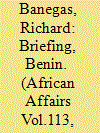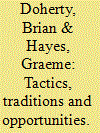|
|
|
Sort Order |
|
|
|
Items / Page
|
|
|
|
|
|
|
| Srl | Item |
| 1 |
ID:
133107


|
|
|
|
|
| Publication |
2014.
|
| Summary/Abstract |
Since 2012, political tension has threatened to undermine Benin's image as a model democracy. The President's efforts to amend the constitution to enable him to contest a third consecutive term, alongside the persecution of some of his former allies, have created a climate of political uncertainty. As a result, a wave of civic protest has gained momentum, a general strike launched in January 2014 lasted for more than four months, and the Catholic Church has broken its silence and denounced the excesses of those in power for the first time since the National Conference in 1990. This Briefing argues that these developments can be considered, on the one hand, as an extension of Benin's passive democratic revolution, a process whereby the co-option of actors from different generations and social strata - the expansion of the "politics of the belly"1 - facilitated the transition from one-party to multi-party rule. On the other hand, the highly volatile situation of the last two years could be said to mark a shift towards a more confrontational scenario of hegemonic rupture in which past agreements on how to share power are torn up by a President determined to capture all economic and political opportunities for himself.
|
|
|
|
|
|
|
|
|
|
|
|
|
|
|
|
| 2 |
ID:
160302


|
|
|
|
|
| Summary/Abstract |
This essay systematically explores the role the immigration issue played in the electoral and overall political power structure of right-wing extremism in Greece as expressed by Golden Dawn. It employs a political-opportunity structure along with a discursive-opportunity structure approach in several instances, with special reference to the so-called refugee crisis during 2015–16. It argues that there is no simple and straightforward connection between immigration and an increase of extremism, and that even sudden and massive immigration flows is not a sufficient condition. Instead, to understand the rise in extremism, long-term, medium-term, and short-term variables must all be considered.
|
|
|
|
|
|
|
|
|
|
|
|
|
|
|
|
| 3 |
ID:
103766


|
|
|
|
|
| Publication |
2011.
|
| Summary/Abstract |
The article examines why some ethnic groups seeking ethno-political autonomy engage in violence while others respond with relative quiescence. It compares and contrasts the ethno-political movements of the Bodos and Misings in northeast India and adopts an integrated approach in which the mobilizing structure and state responses assume equal and important roles that determine the correlation between the mobilizing process and levels of contention. A fundamental claim is that popular support and participation are crucial to shape the trajectories and strategies of ethnic movements. What determines the level of popular following is long-term commitment, legitimacy, and effective communicative strategies adopted by activist organizations. This in turn, generates collective mobilization and produces mechanisms for violence. The absence thereof leads to less disruptive contention. Further, the level of ethnic contention is determined by consistency and extent of ethnic accommodation and the nature of state repression. Consistent accommodation can have a countervailing effect on the activists to launch violent rebellion. Accommodation may range from implementing particular ethno-linguistic policies to selective incentives or cooptation of core political activists by the government. Contrarily, inconsistent accommodation and widespread state repression leads to high levels of violence.
|
|
|
|
|
|
|
|
|
|
|
|
|
|
|
|
| 4 |
ID:
113140


|
|
|
|
|
| Publication |
2012.
|
| Summary/Abstract |
This article compares the tactic of trashing genetically modified crops in activist campaigns in Britain and France. In Britain, most crop trashing was carried out covertly, while in France most activists undertook open, public actions. In seeking an explanation for this, the article shows that the analysis of political opportunities, dominant in comparative studies of social movements, can only take us so far. While it helps explain the occurrence of direct action, it is much less useful in explaining the tactical differences between each country. It is argued that a fuller explanation requires an understanding of how action was shaped by different activist traditions. In France, action was staged as a demonstration of serious, responsible, collective Republican citizenship; in the United Kingdom, activists combined a sceptical view of legality developing from anarchist individualism with an explicitly non-threatening, playful, ethos. The article concludes that a focus on activist traditions can provide an effective bridge between structural and cultural approaches to understanding the determinants of social movement action.
|
|
|
|
|
|
|
|
|
|
|
|
|
|
|
|
| 5 |
ID:
152092


|
|
|
|
|
| Summary/Abstract |
When do anti-base movements manage to influence policy, and when do they fail to do so? Base scholars have largely overlooked what I argue is a significant factor that can shape public and government response to anti-base movements: political opportunities associate with framing efforts by key actors involved. Based on two cases of anti-base movements in South Korea, I show how framing battles between activists and media shape political opportunities afforded to anti-base movements and can ultimately influence movement success.
|
|
|
|
|
|
|
|
|
|
|
|
|
|
|
|
|
|
|
|
|